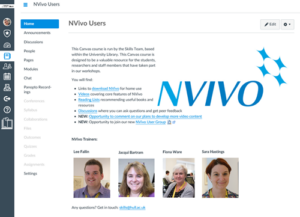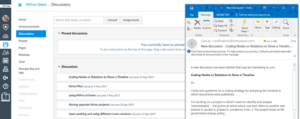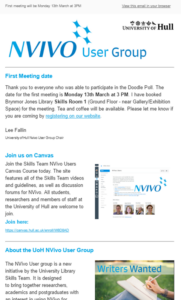
University of Hull Library Skills Adviser, Lee Fallin, share his insights on creating an NVivo community via a user group on campus.
The University of Hull Skills Team provides support to postgraduate students in their use of NVivo for research. A major part of this support has always been our NVivo workshops. The workshops have grown from a couple of sessions in 2012 to a four-session programme totalling 10 hours of tuition.
Every academic year, the sessions are attended by well over 100 staff and students.
Background: Providing ongoing support
The workshop series is designed to go through all the features of NVivo, however, students can face challenges applying the learning from the NVivo sessions to their own work. This often generates a lot of demand for personal one on one appointments and email queries. The students questions are often specific and require a working knowledge of different social science methodologies and methods. While it worked for students, the one on one support and email queries were time consuming, often requiring similar questions to be addressed repeatedly.
First steps: Developing an online community
To help support students, an online module was created within the university Virtual Learning Environment (VLE), Canvas. The aim of this was to help build self-sufficiency in the students and give the opportunity of peer support. The Canvas module includes all our written NVivo support pages, a Talis-based reading list, video demonstrations and discussion forums. Student email queries are also captured on this site and some early student to student support has developed.
Staff users have also been invited to this Canvas module to provide them access to the same peer and self-support. Including staff and students, there are currently 175 active students on the VLE module with only 7 not accepting the invite.

Homepage of NVivo User Group

Peer Discussions and email alert example
Establishing a user group
While the VLE module made progress, more needed to be done. The online interaction was slow to start and we thought some of this could be to do with student confidence with NVivo. It was important to introduce some face to face peer interaction.
To introduce this, the Skills Team launched the University of Hull NVivo User Group in January 2017. The group is open to both staff and students at the university and is designed to build ongoing peer and staff-led NVivo support.
To build the group, everyone who has attended Skills Team NVivo training was directly invited to the group. It is now standard practice to offer group membership in each training session allowing participants to opt in.
There is also a permanent web page for the group sits on Staff Development’s networks section. Group composition is roughly 50/50 between academic staff and postgraduate students. As of May, 60 people have joined the group.
The purpose of the group and initial activities
The NVivo User Group is still a new entity on campus, but it aspires to grow over the next couple of years. In the first meeting, the following goals were set for the group and agreed by the members:
Share experiences
Network with other users
Learn from experienced group members
Find solutions to problems
Discuss more complicated research issues related to the use of NVivo
Showcase work and ask for feedback
The group has made good progress towards these so far.
We have established a series of meetings and a regular newsletter. Meetings are informal in nature and last 90 minutes with coffee/tea and biscuits available which is always a popular attraction.
The first meeting focused on setting up the group and agreeing the terms of reference. This was useful to ensure the group met the needs of the members.
Our second meeting provided the opportunity for people to break into smaller groups based on their research method(s) to discuss the use of NVivo in context. The meetings are complimented by the regular newsletter that is powered by MailChimp.

Example of user group newsletter
So far the group has been very rewarding and well received by the research community.
I’m looking forward to seeing how the group develops over the next year and would love to hear of any other examples of similar groups.

Lee Fallin
Lee Fallin is a Library Skills Advisor at the University of Hull. He has a degree in Geography (University of Hull) and is currently working towards his Doctorate in Education (EdD). He has a background in student engagement, student-centred research and volunteer development from his time working at Hull University Union. He can be found on Twitter @LeeFallin.
